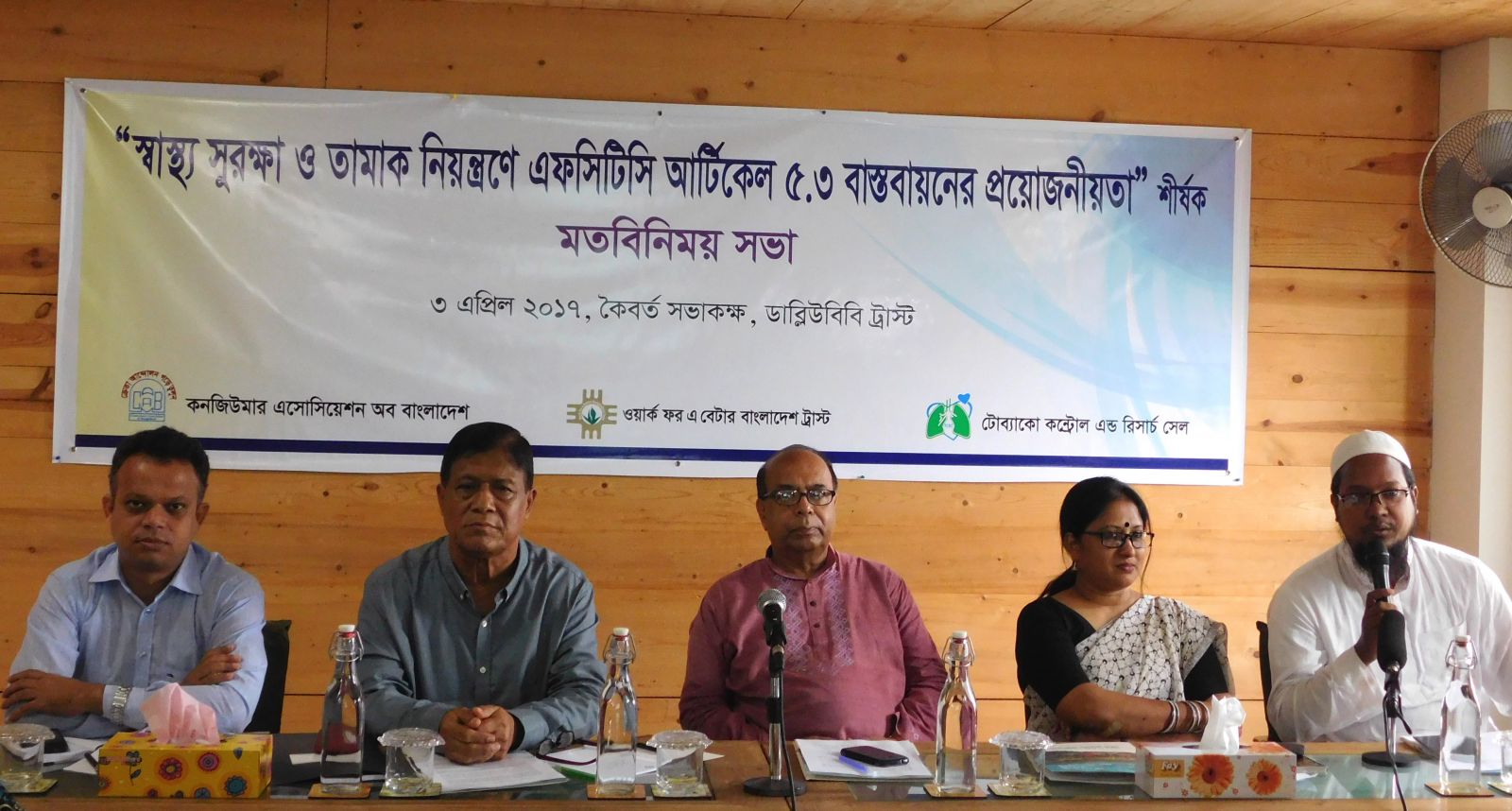

Tobacco companies are influencing policy formulation in many ways to expand their business, government need to take necessary steps to implement the article 5.3 of international treaty Framework Convention on Tobacco Control (FCTC). In Bangladesh, about 100,000 people die in every year due to tobacco related diseases. Smoking and tobacco consumption is responsible for about 14.6% of total death in the country. So, cooperating tobacco company or participating in their activities or stand aside on preventing deception is in fact tantamount to encouraging death.
Experts expressed the above opinion in a view exchange meeting held at Work for a Better Bangladesh (WBB) Trust on 3 April 2017 jointly organized by Consumers Association of Bangladesh (CAB), Tobacco Control Research Cell (TCRC) of Dhaka International University (DIU) and WBB Trust. Retired Chairman of Anti-Corruption Commission (ACC) and CAB president Golam Rahman chaired this meeting while speeches given by DIU Board of Trustee’s president Dr. S Kader Patowari, Bangladesh Cancer Society’s president Prof. Dr. Obayedullah Baki, The Union’s technical advisor Advocate Syed Mahbubul Alam and WBB Trust director Gaous Pearee. Spokes person of Bangladesh Anti-Tobacco Alliance (BATA), Aminul Islam Sujon presented keynote paper and Syeda Anonna Rahman moderated in the program.
In his presentation, Aminul Islam Sujon said ‘Cunning tobacco companies are impeding government’s anti-tobacco programs by various deceptive activities. Earlier, multinational company of deadly product business British American Tobacco Company Bangladesh (BATB) has delayed the processing of amendment of tobacco control act. Moreover, there is negative example like sending letter to British High Commission of Bangladesh for penalty tax exemption. There are directions and guidance in FCTC article 5.3 to prevent such deceptive activities of influencing anti-tobacco policies by tobacco industries. As a signatory of FCTC, Bangladesh has obligations to implement the treaty.
Golam Rahman said, ‘Due to strong law and high price of tobacco, tobacco consumption and cultivation is reducing in developing countries. But tobacco price is very low in Bangladesh. Law implementation is weak. Besides, tobacco cultivation is increasing by various activities of companies. Farmers should be providing support for alternative crop production instead of tobacco.
Prof. Dr. Obayedullah Baki said, ‘Since its foundation in 1978, Bangladesh cancer Society is actively working on tobacco control. We are working on tobacco tax increase with the collaboration of American Cancer Society. We believe government will increase tobacco tax rationally considering the public health.
Syed Mahbubul Alam said, ‘other supporting law such as Bangladesh Standard Testing Institute (BSTI) law, Consumer Right’s Protection Act also can contribute in tobacco control. As there are provisions to provide production date in any kind of packaging products and tobacco is such products that also has to be follow the law is not followed till now. This is not only the violation of two laws but hampers tobacco control. These also have to be brought under light.
Among others, Assistant General Secretary of Bangladesh Cancer Society Prof. Dr. Golam Mohiuddin Faruque, Vice-president of CAB Md. Nazir Hossain, representative of TABINAJ Rokeya Begum, officer of Institute of Wellbeing Md. Masum Billah Bhuiyan spoke in the open discussion.
